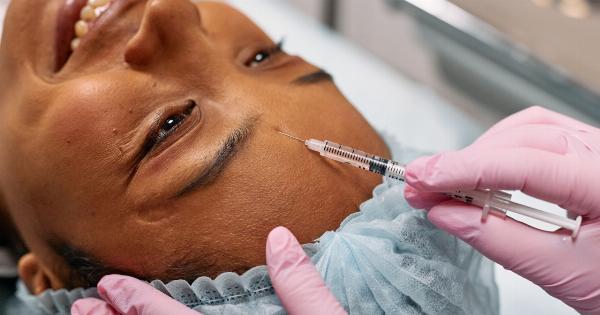Botox has become a popular cosmetic treatment over the years. It involves injecting small amounts of botulinum toxin into the facial muscles, which paralyzes them and reduces the appearance of wrinkles.
Many people opt for this treatment to achieve a more youthful appearance, and it has been proven to work effectively. However, there are situations where getting botox may not be a good idea. In this article, we will discuss when you should not get botox.
1. If you are pregnant or breastfeeding
If you are pregnant or breastfeeding, it is not recommended to get botox. The effects of botox on the baby are not yet known. Furthermore, it is possible that the toxin could pass through the breast milk and harm the baby.
It is better to wait until after you have given birth and stopped breastfeeding before getting botox.
2. If you have a neuromuscular disorder
If you have a neuromuscular disorder, such as multiple sclerosis or ALS, botox could worsen your condition.
Botox is designed to paralyze muscles, and this could cause issues for someone with a neuromuscular disorder as they rely on their muscles to function. It is best to discuss your options with your doctor to determine if botox is safe for you.
3. If you have an infection
If you have an infection, it is best to wait until it has fully cleared up before getting botox. The infection could interfere with the effectiveness of the treatment or cause complications.
It is better to err on the side of caution and wait until you are fully recovered.
4. If you are allergic to any of the ingredients in botox
Some people may be allergic to the ingredients in botox. If you have had an allergic reaction to botox in the past, or if you know that you are allergic to any of the ingredients, it is best to avoid getting botox.
You should discuss alternative treatments with your doctor.
5. If you have a facial muscle or nerve problem
If you have a facial muscle or nerve problem, botox could worsen the issue. Botox paralyzes the muscles, and if you have a muscle or nerve problem, it may not work as intended. Additionally, it could cause further damage or complications.
It is best to speak with your doctor to determine if botox is a safe option for you.
6. If you have an autoimmune disease
If you have an autoimmune disease, such as lupus or rheumatoid arthritis, botox could trigger an adverse reaction. Botox could potentially cause your immune system to attack the muscles, leading to further complications.
It is best to discuss your options with your doctor and consider alternative treatments.
7. If you are taking certain medications
If you are taking certain medications, botox may not be a good idea. Some medications, such as muscle relaxants or blood thinners, can interfere with the effectiveness of botox or increase the risk of complications.
It is essential to inform your doctor of any medication you are taking before undergoing botox treatment.
8. If you have unrealistic expectations
It is crucial to have realistic expectations when it comes to botox. While botox can effectively reduce the appearance of wrinkles, it is not a cure-all. If you have unrealistic expectations, you may end up dissatisfied with the results.
It is best to discuss your goals with your doctor and determine if botox is the right treatment for you.
9. If you are under the age of 18
If you are under the age of 18, it is not recommended to get botox. Botox is designed for individuals over the age of 18, and there is not enough data to determine the safety and effectiveness of botox in children.
Additionally, it is not legal to receive botox without a parent or guardian present.
10. If you have a history of complications
If you have a history of complications with botox or any other cosmetic treatment, it is best to avoid getting botox. Complications could include allergic reactions, infections, or adverse side effects.
It is critical to discuss your medical history with your doctor before undergoing any cosmetic treatment.
Conclusion
While botox can be a safe and effective treatment for wrinkles, it is not suitable for everyone.
If you are pregnant or breastfeeding, have a neuromuscular disorder, have an infection, are allergic to any of the ingredients in botox, have a facial muscle or nerve problem, have an autoimmune disease, are taking certain medications, have unrealistic expectations, are under the age of 18, or have a history of complications, botox may not be a good option for you. It is essential to discuss your medical history and goals with your doctor before undergoing any cosmetic treatment.






























